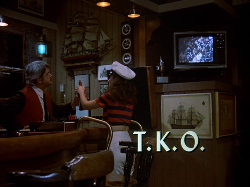TKO (Quincy, M.E.)
| T.K.O. | ||||||||||||||||||||||||||||||||||||||
|---|---|---|---|---|---|---|---|---|---|---|---|---|---|---|---|---|---|---|---|---|---|---|---|---|---|---|---|---|---|---|---|---|---|---|---|---|---|---|

| ||||||||||||||||||||||||||||||||||||||
|
Episode Quote
"In competent hands the blade heals — in incompetent ones, it kills." ~ Dr. Quincy, in T.K.O. (Quincy, M.E.)
Episode Overview
T.K.O. is episode 19 of season 5 of Quincy, M.E., originally aired on NBC on March 20, 1980. Dr. Quincy investigates unexpected deaths linked to illegal office-based surgeries performed by an unqualified surgeon.
Table of Contents
Application of The QME Episode Laws
This episode follows the guiding QME Episode Laws:
✅ **Law 1 – Truth & Justice:** Quincy exposes fatal malpractice masked as legitimate medical procedures.
✅ **Law 2 – Social/Ethical Issues:** Highlights medical regulation gaps and patient vulnerability.
✅ **Law 3 – Sensitive Topics:** Tackles illegal surgery with medical and moral weight.
✅ **Law 4 – Scientific Accuracy:** Forensic pathology reveals infection, wrong technique—supporting evidence-based investigation.
Episode Synopsis
A local chef dies suddenly after abdominal surgery in a non‑licensed office clinic. Quincy uncovers necrosis and septicemia inconsistent with clinical protocol. Further probing leads to a boxer who underwent similar clandestine surgery after an injury; he too succumbs later.
Sam identifies telltale signs of unhygienic operating conditions—unsterile instruments, absence of charting, and lack of anesthesia documentation. Quincy confronts the surgeon and clinic staff, unmasking a money‑driven racket targeting patients avoiding hospital costs.
The medical examiner marshals evidence to ensure charges of manslaughter and medical negligence are brought, prompting renewed discussion on illegal medical practices.
Plot Summary
1. Chef’s death admitted to emergency as "post-op complications". Quincy orders full autopsy. 2. Discovery of necrotic tissue and infection indicates gross malpractice. 3. Investigation uncovers boxer died under similar circumstances. 4. Quincy and Sam trace operations to unlicensed Dr. ***, operating in residential offices. 5. Illicit setup revealed: unsterilized tools, lack of medical records, no anesthesia logs. 6. In court-like confrontation, Quincy’s testimony triggers legal action against rogue surgeon and accomplices.
Main Cast
- **Jack Klugman** as Dr. R. Quincy
- **Robert Ito** as Sam Fujiyama
- **Garry Walberg** as Lt. Monahan
- **John S. Ragin** as Dr. Asten
- **Val Bisoglio** as Danny Tovo
- **Joseph Roman** as Sgt. Brill
Guest Cast
- *To be detailed from credits—chef, boxer, surgeon, patients*
Case File Summary
Victims: A local chef; a boxer Case #: LACC S5E19
Deaths due to septic infections following illegal office surgeries. Quincy’s work leads to charges and closure of the clinic.
Additional Victims
- The unreported patients who survived but suffered complications.
Alleged Perpetrators
- Unlicensed surgeon operating outside hospital standards
- Clinic staff aiding unlawful procedures
Filming Locations
Studio sets for operating office; possible exterior establishing shots of L.A. residential and clinic facades.
Forensic Science Insight
- Necrosis and gangrene patterns mapped to septic processes.
- Comparison of tissue samples and instrument residue.
- Forensic hygiene auditing (sterility, packaging, autoclave logs).
- Emphasis on medical chain-of-custody for evidence.
Themes & Tropes
- **Medical Vigilante Justice** – Quincy crusades against underground medicine.
- **Public Health Risk** – Exposes broader threat to community.
- **Forensic Methodology** – Pathology as tool to uncover malpractice.
- **Ethical Medicine vs Greed** – Contrasting responsible care and rogue profiteering.
Reception & Legacy
Praised by viewers for its timely focus on medical oversight and for shedding light on unregulated healthcare. Quincy’s intervention was noted as emblematic of the show’s socially engaged storytelling.
Trivia
- First major episode to tackle illegal “back-alley” surgery in a prime-time procedural.
- Script by Sam Egan showed influence of real-world medical licensing debates from late 1970s.
Cultural Impact
T.K.O. contributed to public conversations about medical licensing enforcement, influencing later medical dramas emphasizing malpractice and ethical standards.
